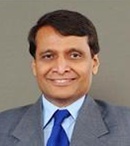Suresh Prabhu wants Railways to be real growth engine
19 Nov 2014
 Railway minister Suresh Prabhakar Prabhu is all set to embark on a restructuring exercise of the Indian Railways that would see several projects open up for private sector and foreign direct investment even as the Bibek Debroy Committee is yet to submit its report on resource mobilisation and restructuring of the Railways.
Railway minister Suresh Prabhakar Prabhu is all set to embark on a restructuring exercise of the Indian Railways that would see several projects open up for private sector and foreign direct investment even as the Bibek Debroy Committee is yet to submit its report on resource mobilisation and restructuring of the Railways.
In his customary message to Railway employees on assumption of office as minister of railways, Suresh Prabhu said Indian Railways is the growth engine as well as the powerhouse of the country and that they should strive to live up to that responsibility.
''We have the onerous responsibility to provide the best transportation facilities to the countrymen and give impetus to economic growth of the country. I consider you all as my family members and as I am serving at an apex of this great organisation, I consider myself as the head of your family.''
Beyond the strength of numbers such as the number of passengers carried daily, tonnage loaded and transported, its network size, revenues generated, the sheer strength of its staff, he said, the Railways is intimately connected with everyday life of its citizens.
But, as is true for every dynamic system, a catalyst is required from time to time to take the momentum forward, he said, adding, ''I would like you to be that catalyst and take the Railway forward into the future and along with it, India.''
However, anticipating resistance from within, the railway ministry has planned a step-by-step movement towards opening up the largest public sector enterprise to private players although the new minister has already started working in that direction.
Prabhu wanted Railwaymen to "own" the railways for its system amelioration, progress and its leap into the future.
Quoting Leo Tolstoy, he said, ''Everyone thinks of changing the world, but no one thinks of changing himself.''
Focus, he said, should be on utmost safety of the passenger and employee and the quality of services offered to customers.
He exhorted railway employees to remain committed in their role of sustaining the Indian Railways as the pivot of the national economy, the life-line of the nation and its binding force.
Soon after Suresh Prabhu assumed charge as railway minister on 11 October, the railway ministry released a list of priorities, part of the 'sectoral guidelines for domestic / foreign direct investment in Railways'.
The list includes the Mumbai-Ahmedabad and the Chennai-Bengaluru-Mysore high speed corridors among projects that entail an investment of around Rs100,000 crore. The ministry has also listed several major stations to be developed as passenger terminals through renovation and fresh investment.
The ministry note said it identified dedicated freight lines, manufacturing of rolling stock, including train sets and locomotives, railway electrification, signalling system, freight terminals/logistics parks, passenger terminals, standalone passenger corridors, (branch lines and hill railways) for fresh investment.
The note, however, said the list was indicative and new projects can be added, or listed projects can be deleted depending on the outcome of project specific detailed technical / financial due diligence by the ministry of railways after submission of the techno economic feasibility report and financial / revenue model.
''The projects will be implemented only when found to be financially viable and bankable with viability gap funding admissible (20 per cent of the cost of the project or as modified from time to time) as per the current VGF policy,'' the note said.
The new railways minister, who had impressed everybody by his ideas and performance as the power minister in the Atal Bihari Vajpayee government, now raises even more excitement because of the opportunities that the Indian Railways offers by way of reforms and restructuring, to become a potent force for reviving India's economic growth.
The Indian Railways has been consistently losing market share in goods transportation to the roads sector and now even passenger volumes growth has become a challenge.
Its finances are under strain with the share of its gross operating costs in total revenues rising at an unhealthy rate and the burden of pension liability becoming even more unmanageable. Its safety record is a cause for concern and project delays are getting longer.
It is failing even in performing the basic tasks of maintaining punctuality of its services and providing clean trains and railway stations.




















